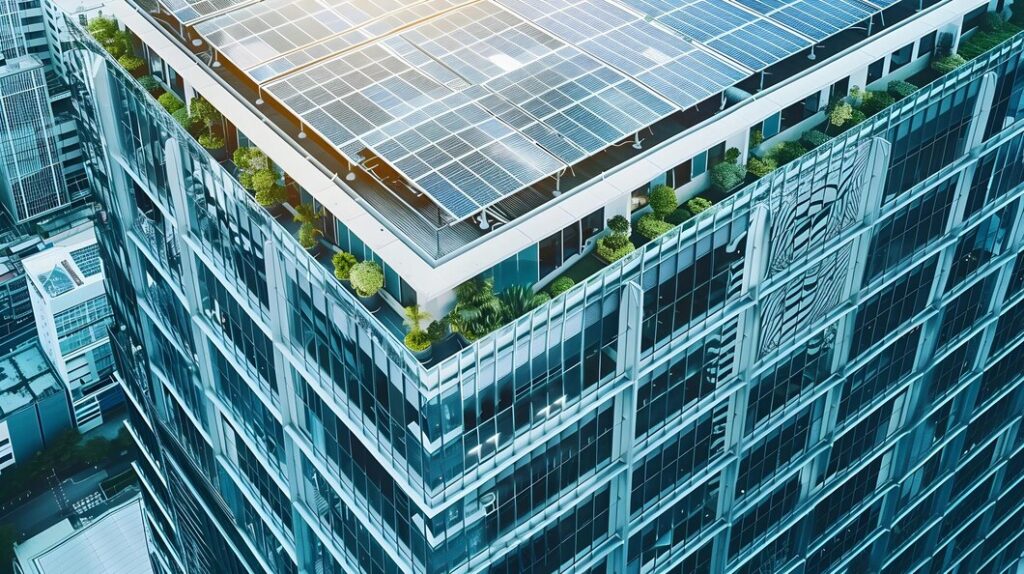Solar panel installations on commercial properties have gained popularity in recent years due to their environmental benefits and potential cost savings. Property owners have found that solar panels not only attract environmentally conscious tenants but also increase property value and enhance market competitiveness. These advantages make solar panel installations a smart investment for commercial real estate.
Environmental Benefits of Solar Panels
The environmental benefits of solar panels are:
Reduction in Carbon Footprint
Installing solar panels helps reduce a property’s carbon footprint by utilizing clean, renewable energy that doesn’t produce greenhouse gases or other pollutants. This aligns with the increasing societal and corporate emphasis on environmental responsibility, promoting sustainable practices, and reducing reliance on fossil fuels.
Contribution to Sustainability Goals
Many businesses have sustainability goals and seek properties that align with these objectives. Solar panels can significantly contribute to achieving these goals by providing clean, renewable energy and reducing operational carbon footprints. Properties with solar installations become more attractive to environmentally conscious tenants and investors who prioritize green practices. This not only enhances the property’s marketability but also supports broader corporate sustainability initiatives, fostering a positive environmental impact.
Financial Benefits of Solar Panels for Commercial Buildings
Some financial advantages of installing solar panels in commercial buildings are:
Lower Operating Costs
One of the most immediate benefits of solar panel installations is the reduction in energy costs. Solar panels generate electricity on-site, which can offset the amount of power a property needs to purchase from the grid. This leads to significant savings on utility bills, as the reliance on external energy sources decreases. Over time, these savings can accumulate, making solar panels a cost-effective investment while also providing a sustainable energy solution.
Financial Incentives
Various financial incentives are available for properties that install solar panels, including tax credits, rebates, and grants. These incentives can significantly reduce the upfront costs of installation, making solar energy more accessible and affordable. For instance, federal and state tax credits can offset a substantial portion of the installation expenses, while rebates from utility companies or local governments provide additional financial support.
Grants may also be available for certain types of projects or properties in specific locations. By lowering the initial investment, these incentives improve the return on investment for solar panel installations, making them an even more attractive option for property owners. Ultimately, these financial benefits encourage the adoption of renewable energy, contributing to broader sustainability goals.
Increased Property Value
Properties with solar panel installations often enjoy higher property values, as potential buyers are willing to pay a premium for buildings with lower operating costs and sustainable features. Solar panels reduce energy expenses, making these properties more cost-effective to operate. Studies have shown that commercial properties with solar installations can sell for significantly more compared to those without. This added value makes solar panels not only a smart environmental choice but also a beneficial financial investment.
Market Competitiveness of Solar Panels for Commercial Use
Here is how solar panels can provide market competitiveness to commercial properties:
More Attractive to Eco-Conscious Tenants
Businesses are increasingly seeking to align with sustainable practices. Properties with solar panels can attract tenants who prioritize environmental responsibility. This can lead to higher occupancy rates and longer lease agreements.
Enhanced Corporate Image
Companies that lease or own buildings with solar installations can enhance their corporate image by demonstrating a strong commitment to sustainability. In industries where corporate social responsibility (CSR) is highly valued by customers and stakeholders, such initiatives can distinguish businesses as environmentally responsible leaders.
By visibly supporting renewable energy and reducing their carbon footprint, these companies align their operations with broader sustainability goals and expectations. This positive stance not only improves brand reputation but also attracts environmentally conscious consumers and investors who prioritize ethical and sustainable practices. Eventually, showcasing solar installations can strengthen a company’s credibility and competitiveness in the market.
Competitive Edge
In competitive real estate markets, properties with unique selling points have an advantage. Solar panels can provide this edge by offering both environmental and financial benefits, setting properties apart from those that lack sustainable features.
Practical Considerations of the Solar Panels for Commercial Use
Some practical considerations for solar panels are:
Installation Costs and Payback Period
Solar panel installations require a significant upfront investment, but they offer long-term savings and financial benefits that make them a worthwhile investment for property owners. One crucial consideration is the payback period, which represents the time required for the cumulative savings from reduced energy costs to offset the initial installation expenses.
Factors influencing the payback period include the size and efficiency of the solar system, available financial incentives like tax credits and rebates, local electricity rates, and maintenance costs. Generally, as solar technology improves and costs decline, payback periods have become shorter, often ranging from 5 to 10 years depending on these variables. Once the payback period is surpassed, the ongoing energy savings and potential revenue from selling excess energy back to the grid can provide a substantial return on investment over the system’s lifespan, typically 25 years or more.
Maintenance and Lifespan
Solar panels are known for their durability and longevity, often exceeding 25 years with minimal maintenance requirements. Regular cleaning to remove dirt, debris, and any potential shading is important to guarantee optimal efficiency. Periodic inspections help detect and address any issues early, such as potential damage or reduced performance due to aging components. Overall, their robust design and low maintenance needs contribute to their reliability as a sustainable energy solution for property owners over the long term.
Building Suitability
Not all buildings are suitable for solar panel installations. Factors such as roof orientation, shading, and structural integrity need to be considered. Professional assessments can determine a property’s suitability for solar panels.
Conclusion
Incorporating solar panels into commercial properties is not just a trend but a smart business decision. It aligns with global sustainability goals, offers significant financial benefits, and enhances property appeal. For commercial property owners looking to stay ahead in a competitive market, solar panel installations are a valuable consideration.
FAQs
What type of solar panel is best for commercial use?
Monocrystalline solar panels are often considered the best for commercial use due to their high efficiency and long lifespan. They perform well in limited space and have a sleek design, making them suitable for various commercial applications.
How many solar panels for a commercial building?
The number of solar panels needed for a commercial building depends on the building’s energy consumption, the available roof space, and the efficiency of the panels. A typical commercial installation may require anywhere from dozens to several hundred panels.
How do solar panels for commercial buildings decrease operating costs?
Solar panels reduce operating costs by generating electricity on-site, which lowers the amount of energy needed to be purchased from the grid. This can significantly reduce utility bills and provide long-term savings on energy expenses.
Can solar panels increase your commercial property value?
Yes, solar panels can increase commercial property value by reducing operating costs and making the property more attractive to eco-conscious tenants and buyers. Properties with solar installations often sell at a premium compared to those without.
What are the financing options for solar for commercial buildings?
Financing options for commercial solar installations include power purchase agreements (PPAs), solar leases, loans, and various incentives such as tax credits, rebates, and grants. These options can help reduce upfront costs and make solar energy more accessible for commercial property owners.

